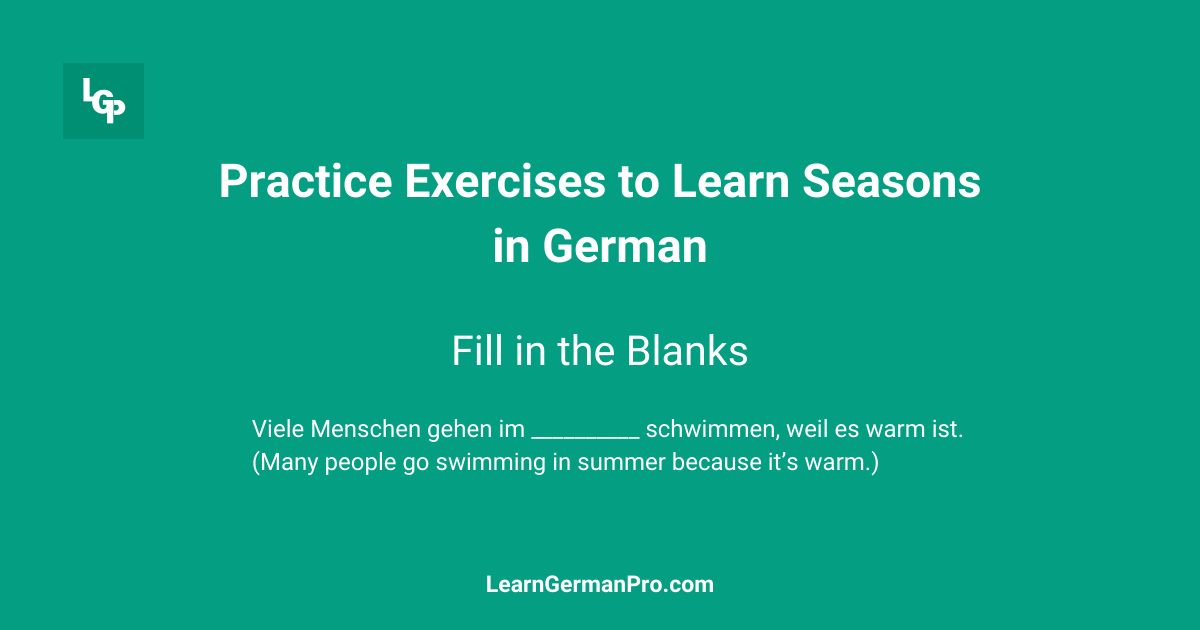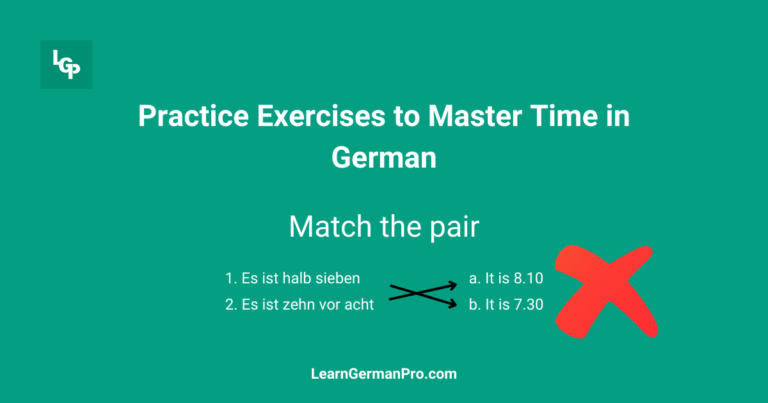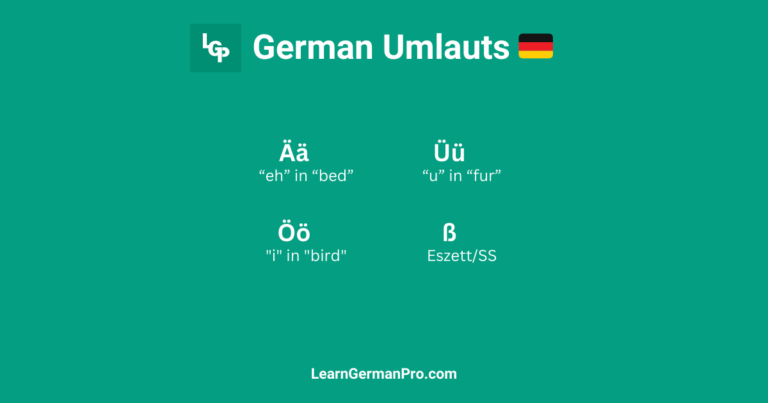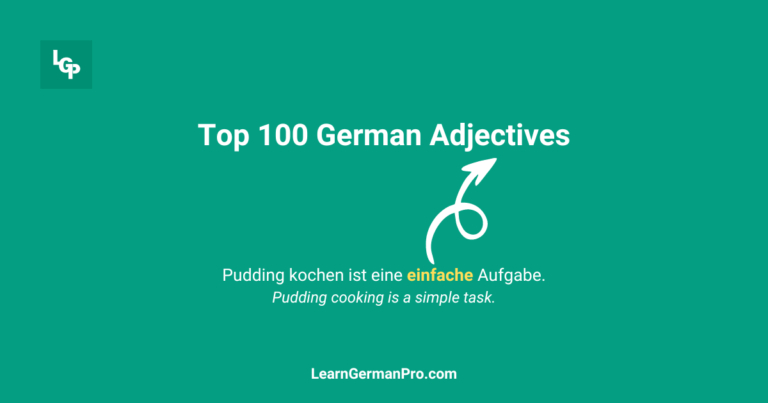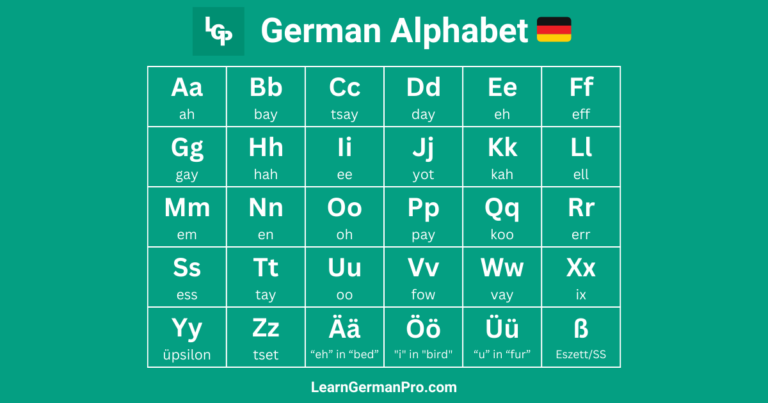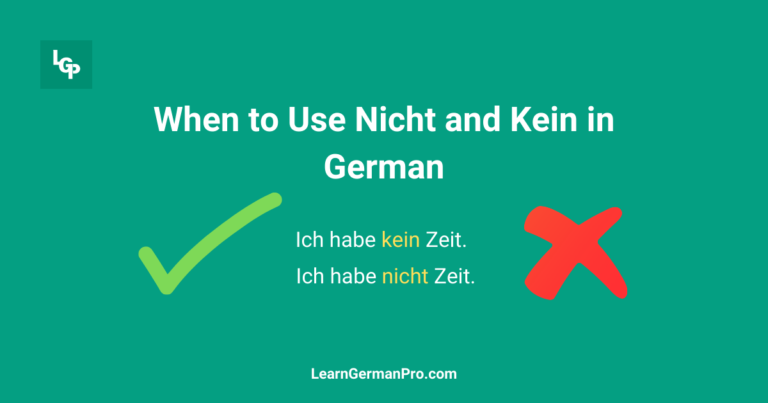Practice Exercises to Learn Seasons in German
Want to learn different seasons in German? This post covers lots of exercises to practice and learn different seasons in German.
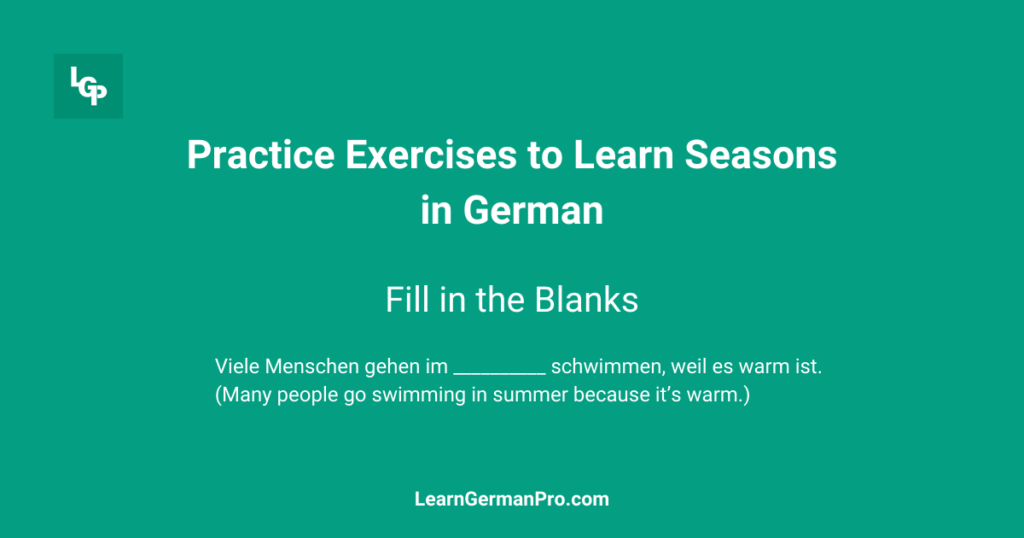
1. Fill in the Blanks (Lückentext)
Fill in the blanks with the correct season in German:
(Use: Frühling, Sommer, Herbst, Winter)
- Im __________ wachsen die Blumen und das Wetter wird wärmer.
(In spring, flowers grow and the weather becomes warmer.) - __________ ist die kälteste Jahreszeit in Deutschland.
(Winter is the coldest season in Germany.) - Viele Menschen gehen im __________ schwimmen, weil es warm ist.
(Many people go swimming in summer because it’s warm.) - Im __________ fallen die Blätter von den Bäumen.
(In autumn, leaves fall from the trees.) - Weihnachten ist im __________.
(Christmas is in winter.)
The four distinct seasons: Germany has four clear seasons, each lasting about three months. Spring (Frühling) starts around March, Summer (Sommer) around June, Autumn (Herbst) around September, and Winter (Winter) around December.
2. Match the Pairs (Paare zuordnen)
Match the German seasons with their English translations:
| German | English |
|---|---|
| 1. Frühling | a) Summer |
| 2. Sommer | b) Winter |
| 3. Herbst | c) Spring |
| 4. Winter | d) Autumn |
Christmas Markets: In winter, especially in December, Germany becomes famous for its Christmas markets, called “Weihnachtsmärkte.” These markets are popular all over the country.
3. True or False (Wahr oder Falsch)
Decide if the following statements are true or false:
- Der Frühling kommt nach dem Sommer.
(Spring comes after summer.) - Der Sommer ist die heißeste Jahreszeit.
(Summer is the hottest season.) - Im Herbst schneit es immer.
(It always snows in autumn.) - Im Winter feiern viele Deutsche Weihnachten.
(In winter, many Germans celebrate Christmas.) - Der Frühling beginnt im März in Deutschland.
(Spring starts in March in Germany.)
Spring Festivals: Spring in Germany is marked by the famous “Frühlingsfest” (Spring Festival) in cities like Munich, which is like a smaller version of Oktoberfest.
4. Multiple Choice (Mehrfachauswahl)
Choose the correct answer:
- Wann beginnt der Sommer in Deutschland?
(When does summer start in Germany?)- a) Im Dezember
- b) Im Juni
- c) Im Oktober
- Welche Jahreszeit ist gut zum Skifahren?
(Which season is good for skiing?)- a) Frühling
- b) Herbst
- c) Winter
- Welche Farben haben die Blätter im Herbst?
(What color are the leaves in autumn?)- a) Grün
- b) Gelb und Orange
- c) Blau
- In welcher Jahreszeit gibt es lange Tage und kurze Nächte?
(In which season are the days long and the nights short?)- a) Sommer
- b) Frühling
- c) Herbst
- Wann ist Weihnachten?
(When is Christmas?)- a) Im Herbst
- b) Im Winter
- c) Im Frühling
Summer Time (Sommerzeit): Daylight saving time, called “Sommerzeit” in Germany, starts in late March, where clocks are moved forward by one hour.
5. Sentence Construction (Sätze bilden)
Build a correct sentence using the words provided. You can use each word only once.
Example:
Word bank: ist / Sommer / heiß / sehr / der
Correct sentence: Der Sommer ist sehr heiß.
- Schnee / Winter / im / es / gibt
- warm / ist / Frühling / der
- bunt / die / Blätter / im / sind / Herbst
- Weihnachten / Winter / feiern / im / viele Menschen
Harvest Time in Autumn: Germany has a tradition of celebrating the harvest season in autumn, especially in rural areas, with events called “Erntedankfest.”
6. Listening Exercise (Hörübung)
(You can read the following text aloud or ask someone to do so for you.)
Audio Text:
“Im Frühling beginnt das neue Jahr mit blühenden Blumen. Der Sommer ist warm und viele Menschen gehen schwimmen. Im Herbst fallen die Blätter von den Bäumen und im Winter wird es kalt. Es gibt Schnee und die Tage sind kürzer.”
Questions:
- In welcher Jahreszeit blühen die Blumen?
(In which season do flowers bloom?) - Was machen viele Menschen im Sommer?
(What do many people do in summer?) - Wann fallen die Blätter von den Bäumen?
(When do the leaves fall from the trees?) - Welche Jahreszeit hat kurze Tage?
(Which season has short days?)
Answer Key
1. Fill in the Blanks
- Frühling
- Winter
- Sommer
- Herbst
- Winter
2. Match the Pairs
- c) Spring
- a) Summer
- d) Autumn
- b) Winter
3. True or False
- False
- True
- False
- True
- True
4. Multiple Choice
- b) Im Juni
- c) Winter
- b) Gelb und Orange
- a) Sommer
- b) Im Winter
5. Sentence Construction
- Im Winter gibt es Schnee.
- Der Frühling ist warm.
- Im Herbst sind die Blätter bunt.
- Viele Menschen feiern Weihnachten im Winter.
6. Listening Exercise
- Im Frühling
- Sie gehen schwimmen.
- Im Herbst
- Im Winter
Additional Practice Tips:
- Watch Weather Reports: Try watching simple German weather reports or use weather apps in German to see the seasons in context.
- Plan Activities for Each Season: Practice speaking about what activities you enjoy during each season, like “Im Sommer gehe ich schwimmen” (In summer, I go swimming).

